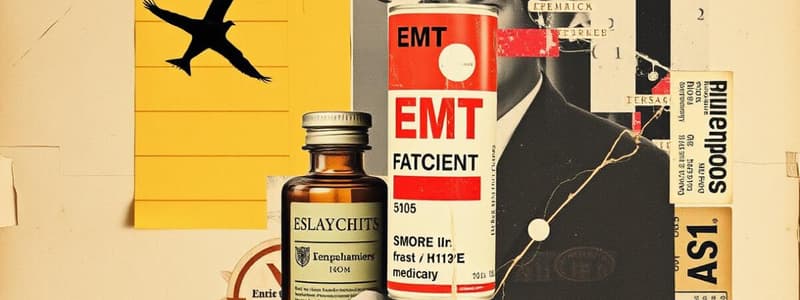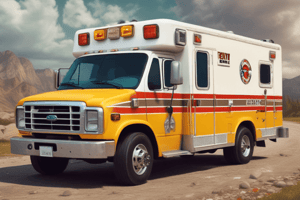Podcast
Questions and Answers
What are the 7 medications an EMT can administer?
What are the 7 medications an EMT can administer?
Activated Charcoal, Albuterol, Aspirin, Epinephrine, Nitroglycerin, Oral Glucose, & Diphenhydramine.
What is the trade name of Activated Charcoal?
What is the trade name of Activated Charcoal?
- Actichar (correct)
- Bayer
- Ventolin
- EpiPen
What are the trade names of Albuterol?
What are the trade names of Albuterol?
- Proventil (correct)
- Benadryl
- Ventolin (correct)
- Nitrostat
What are the trade names of Aspirin?
What are the trade names of Aspirin?
What are the trade names of Epinephrine?
What are the trade names of Epinephrine?
What is the trade name of Nitroglycerin?
What is the trade name of Nitroglycerin?
What are the trade names of Oral Glucose?
What are the trade names of Oral Glucose?
What is the trade name of Diphenhydramine?
What is the trade name of Diphenhydramine?
What is the mechanism of action for Activated Charcoal?
What is the mechanism of action for Activated Charcoal?
What is the mechanism of action for Albuterol?
What is the mechanism of action for Albuterol?
What is the mechanism of action for Aspirin?
What is the mechanism of action for Aspirin?
What is the mechanism of action for Epinephrine?
What is the mechanism of action for Epinephrine?
What is the mechanism of action for Nitroglycerin?
What is the mechanism of action for Nitroglycerin?
What is the mechanism of action for Oral Glucose?
What is the mechanism of action for Oral Glucose?
What is the mechanism of action for Diphenhydramine?
What is the mechanism of action for Diphenhydramine?
What are the indications for Activated Charcoal?
What are the indications for Activated Charcoal?
What are the indications for Albuterol?
What are the indications for Albuterol?
What are the indications for Aspirin?
What are the indications for Aspirin?
What are the indications for Epinephrine?
What are the indications for Epinephrine?
What are the indications for Nitroglycerin?
What are the indications for Nitroglycerin?
What are the indications for Oral Glucose?
What are the indications for Oral Glucose?
What are the indications for Diphenhydramine?
What are the indications for Diphenhydramine?
What are the contraindications for Activated Charcoal?
What are the contraindications for Activated Charcoal?
What are the contraindications for Albuterol?
What are the contraindications for Albuterol?
What are the contraindications for Aspirin?
What are the contraindications for Aspirin?
What are the contraindications for Epinephrine?
What are the contraindications for Epinephrine?
What are the contraindications for Nitroglycerin?
What are the contraindications for Nitroglycerin?
What are the contraindications for Oral Glucose?
What are the contraindications for Oral Glucose?
What are the contraindications for Diphenhydramine?
What are the contraindications for Diphenhydramine?
What is the composition of Activated Charcoal?
What is the composition of Activated Charcoal?
What are the medication forms of Albuterol?
What are the medication forms of Albuterol?
What are the medication forms of Aspirin?
What are the medication forms of Aspirin?
What is the medication form of Epinephrine?
What is the medication form of Epinephrine?
What are the medication forms of Nitroglycerin?
What are the medication forms of Nitroglycerin?
What is the medication form of Oral Glucose?
What is the medication form of Oral Glucose?
What are the medication forms of Diphenhydramine?
What are the medication forms of Diphenhydramine?
What is the dosage and administration route for Activated Charcoal?
What is the dosage and administration route for Activated Charcoal?
What is the dosage and administration route for Albuterol?
What is the dosage and administration route for Albuterol?
What is the dosage and administration route for Aspirin?
What is the dosage and administration route for Aspirin?
What is the dosage and administration route for Epinephrine?
What is the dosage and administration route for Epinephrine?
What is the dosage and administration route for Nitroglycerin?
What is the dosage and administration route for Nitroglycerin?
What is the dosage and administration route for Oral Glucose?
What is the dosage and administration route for Oral Glucose?
What is the dosage and administration route for Diphenhydramine?
What is the dosage and administration route for Diphenhydramine?
What are the 6 Rights of Medication Administration?
What are the 6 Rights of Medication Administration?
Flashcards are hidden until you start studying
Study Notes
EMT Basic Medications Overview
- EMTs can administer seven key medications: Activated Charcoal, Albuterol, Aspirin, Epinephrine, Nitroglycerin, Oral Glucose, and Diphenhydramine.
Trade Names of Medications
- Activated Charcoal: Actichar
- Albuterol: Ventolin, Proventil
- Aspirin: Bayer, St. Joseph
- Epinephrine: EpiPen, Twinject
- Nitroglycerin: Nitrostat
- Oral Glucose: Insta-Glucose, Glutose
- Diphenhydramine: Benadryl
Mechanism of Action
- Activated Charcoal: Binds to toxins in the gastrointestinal tract; immediate onset.
- Albuterol: Relaxes smooth bronchial muscles, resulting in bronchodilation.
- Aspirin: Inhibits clotting processes.
- Epinephrine: Causes vasoconstriction and relaxation of bronchial smooth muscles.
- Nitroglycerin: Dilates coronary vessels, reducing heart workload and oxygen demand.
- Oral Glucose: Increases blood glucose levels.
- Diphenhydramine: Alleviates allergic reactions.
Indications for Use
- Activated Charcoal: For oral poisoning.
- Albuterol: For respiratory distress from bronchoconstriction and wheezing.
- Aspirin: For new onset cardiac chest pain.
- Epinephrine: For severe allergic reactions with hypotension or respiratory distress.
- Nitroglycerin: For cardiac chest pain.
- Oral Glucose: For altered mental status with low blood glucose (under 60 mg) or history of diabetes.
- Diphenhydramine: For allergic dermatitis, hypersensitivity reactions, motion sickness, and sleep disorders.
Contraindications
- Activated Charcoal: Not for use in comatose patients or after corrosive ingestion; avoid with other oral drugs.
- Albuterol: Contraindicated in allergies, if maximum dose is given, or with rapid heart rate.
- Aspirin: Avoid in patients with allergies, internal bleeding, or asthma.
- Epinephrine: Use only in life-threatening emergencies; consult medical control otherwise.
- Nitroglycerin: Contraindicated with systolic blood pressure below 100, head injury, recent ED use, or maximum dose taken within 30 minutes.
- Oral Glucose: Do not administer if the patient is unconscious, unable to swallow, or has nausea/vomiting.
- Diphenhydramine: Avoid in neonates and premature infants.
Medication Forms
- Activated Charcoal: Available in 25 g/125 mL or 50 g/250 mL bottles; mixed with water.
- Albuterol: Comes as a metered dose inhaler or liquid for nebulization.
- Aspirin: Available as 81 mg chewable, 160 mg, and 325 mg tablets.
- Epinephrine: Provided in autoinjector form.
- Nitroglycerin: Offered as tablets or spray.
- Oral Glucose: Comes in gel form.
- Diphenhydramine: Available as capsules, tablets, chewable tablets, liquid, injection, and topical cream.
Dosage & Administration
- Activated Charcoal: 1-2 grams per kg, administered orally.
- Albuterol: 2 puffs (metered dose inhaler) or 2.5 mg (nebulizer), with puffs 1-2 minutes apart.
- Aspirin: Administer 160-325 mg orally.
- Epinephrine: One autoinjector; adult dose is 0.3 mg, pediatric is 0.15 mg.
- Nitroglycerin: 0.3-0.4 mg sublingually every 3-5 minutes, max of 3 tablets or sprays.
- Oral Glucose: 1 tube (15 mg) applied via bite stick or tongue depressor.
- Diphenhydramine: 25-50 mg orally every 4-8 hours.
Six Rights of Medication Administration
- Ensure the right Patient, Medication, Dose, Route, Time, and Documentation are followed during medication administration.
Studying That Suits You
Use AI to generate personalized quizzes and flashcards to suit your learning preferences.




